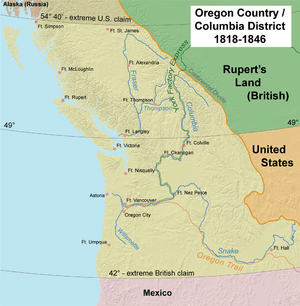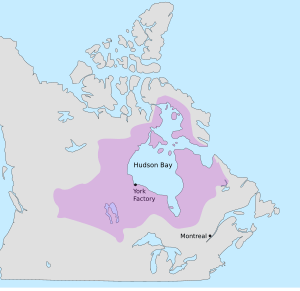James Sinclair (fur trader) facts for kids
Quick facts for kids
James Sinclair
|
|
|---|---|
| Born | 1811 |
| Died | March 26, 1856 along the Columbia River
|
| Monuments | Sinclair Pass |
| Occupation | trader and explorer |
| Employer | Hudson's Bay Company |
| Relatives | William Sinclair (brother) |

James Sinclair (born 1811, died 1856) was an important trader and explorer. He worked for the Hudson's Bay Company (HBC). Sinclair led two big groups of settlers from the Red River Colony to the Columbia River valley. The HBC wanted these trips to help Britain claim land during the Oregon boundary dispute.
Contents
Early Life of James Sinclair
James Sinclair was born in 1811 in Rupert's Land. His mother was a Cree woman named Nahovway. His father, William Sinclair, was a manager for the Hudson's Bay Company. James went to school in Scotland at the University of Edinburgh.
Leading Settlers to Oregon Country
James Sinclair was chosen to guide families to Fort Vancouver. This fort was located on the Columbia River. Most of these families were Métis people. Métis are people with mixed Indigenous and European heritage. They were skilled hunters and good at living off the land.
The Pugets Sound Agricultural Company (PSAC) hired these families. They wanted them to farm and raise animals in what is now Washington state.
The First Journey in 1841
In June 1841, the first group left Fort Garry. There were 23 families, with 121 people in total. They traveled north along the Red River. Then they crossed Lake Winnipeg. They followed the Saskatchewan River system to Fort Edmonton.
From Fort Edmonton, a Cree chief named Maskepetoon guided them. He stayed with the group until they reached Fort Vancouver. He then sailed home on a ship called the Beaver.
They went through Lake Minnewanka. They reached where the Spray and Bow rivers meet. They followed the Spray River valley. Then they trekked along a stream called Whiteman's Creek.
Crossing the Rocky Mountains
From Whiteman's Creek, they crossed the Great Divide of the Rocky Mountains. This was a new route, later called Whiteman's Pass. From the top, they went southwest down the Cross River. They reached the Kootenay River.
They entered the upper Columbia River area through Sinclair Pass. This pass is near Radium Hot Springs today. From there, they traveled southwest to Lake Pend'Oreille. They then went to an old fort called Spokane House. Next, they reached Fort Colvile. Finally, they arrived at Fort Vancouver.
When they reached Fort Vancouver, there were 21 families and 116 people. Fourteen families moved to Fort Nisqually. The other seven families went to Fort Cowlitz.
The Oregon Boundary Dispute
Even with these efforts, Britain gave up its claims to land south of the 49th parallel. This happened in 1846 with the Oregon Treaty. This treaty solved the Oregon boundary dispute. Most of this land went to the United States.
Later Life and Second Journey
Sinclair returned to the Red River Colony. He traveled to St. Louis, then California, and back to Oregon Territory. He also went to London. There, he asked the government to support the Métis people's right to trade furs freely. This made Governor Simpson of the HBC angry.
However, Sinclair and Governor Simpson later became friends again. Sinclair rejoined the Hudson's Bay Company.
In 1854, Sinclair led a second group of settlers. They traveled from Red River to Fort Nez Percés. The HBC had promised him 200 cattle for this trip. When he reached the Rockies, he followed the Kananaskis River south. He made a difficult crossing along the Elk River. This led him into the Columbia-Kootenay region.
James Sinclair died in an attack by Indigenous people. This happened at a settlement called the Cascades on the Columbia River. He died on March 26, 1856.
Legacy
Several places in the Canadian Rockies are named after James Sinclair. These include Mount Sinclair, Sinclair Pass, and Sinclair Canyon.
 | Claudette Colvin |
 | Myrlie Evers-Williams |
 | Alberta Odell Jones |


